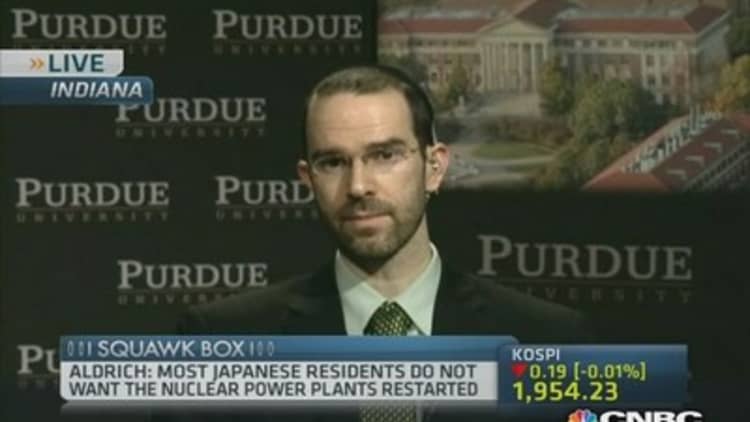
As Japan marked the third anniversary on Tuesday of the devastating earthquake and tsunami that sparked a nuclear emergency, debate rages as to whether the country should return to nuclear power.
Japan shut down its reactors in the wake of the meltdown at the Fukushima nuclear power plant following the March 2011 earthquake and tsunami and Prime Minister Shinzo Abe is keen to return the resource-poor country back to nuclear energy.
(Read more: Japan's tsunami survivors suffer in silence three years after disaster)
He faces opposition from a wary public as well as high-profile figures such as former Prime Minister Junichiro Koizumi. On Sunday, tens of thousands of Japanese staged an anti-nuclear rally in Tokyo, just ahead of the anniversary of the earthquake and tsunami that claimed nearly 20,000 lives.
"Clearly today, the third anniversary of the Fukushima disaster, energy is very much in the thinking here as well as the more tragic consequences of the tsunami," said Alistair Newton, senior political analyst at Nomura, told CNBC from Tokyo.
Japan needs more fossil fuels to make up for the closures of its nuclear power plants, fueling worries that high energy costs could hurt the economy. Data on Monday showed that Japan's current account deficit widened to a record of 1.589 trillion yen ($15.4 billion) in January.
(Read more: Japan's fourth-quarter GDP revised down)
Against this backdrop, Abe last month announced details of a plan that defines nuclear power as an important long-term source of energy for the world's number three economy. According to media reports, the new Basic Energy Plan will seek to restart Japan's nuclear reactors.
"You have to consider the tremendous cost of the legacy of Fukushima, which may cost in excess of $125 billion once all the compensation is paid," said Edwin Lyman, senior scientist at the global security program of the Union of Concerned Scientists in Washington. "The site is going to remain radioactive for decades and is still leaking radioactivity into the ocean. You have to wonder what you're buying by restarting those plants."
The earthquake and tsunami that hit Japan in March 2011 soon developed into a nuclear catastrophe as one system after another at the Fukushima Daiichi nuclear power plant failed. Three of the plant's six reactors suffered meltdowns, releasing deadly radiation into the sea and air.
Following Fukushima, many countries put their nuclear energy plans under review. Western Europe saw 11 reactors close between 2010 and 2012, according to market research firm Euromonitor.
(Read more: The next weak nuclear link? Here's where to look)
Abe will have a tough time convincing voters that returning to nuclear power is in Japan's interests, analysts say.
"We see a big gap right now between the political leaders and the average person in Japan. I think the solution might be the NRA [Nuclear Regulatory Authority], a new agency in charge of regulation will stall the process for a few months, and Abe hopes, during that period, people will calm down and see nuclear power possibility again," said Daniel Aldrich, associate professor of political science at Purdue University.
A crisis in Ukraine, which has highlighted the risks associated with relying on energy imports from Russia, could help Abe win over public opinion.
(Read more: Russia energy a threat to Europe, but not the US)
"Of course oil from the Middle East and Russia make Japan more dependent on other countries and make Abe seemingly weak. But in actual fact, he [Abe] definitely will use that as an argument to try and convince people to come back onboard," Aldrich said.
— By CNBC.Com's Dhara Ranasinghe; Follow her on Twitter @DharaCNBC


